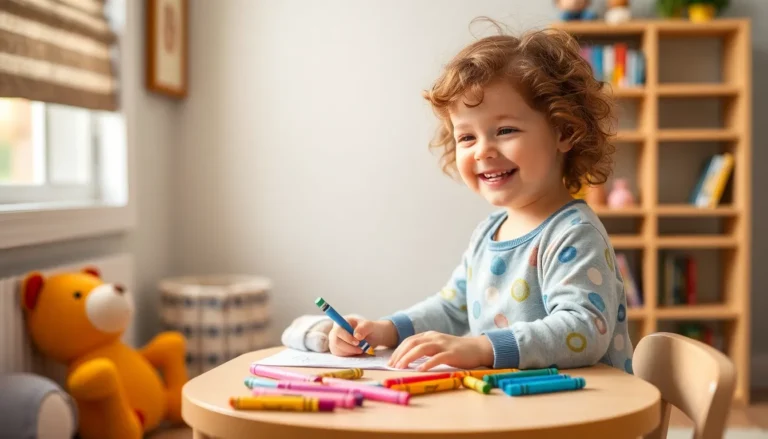Table of Contents
ToggleImagine a world where kids express their feelings through melodies instead of tantrums. Music therapy for children offers just that—a harmonious blend of fun and healing. It’s not just about hitting the right notes; it’s about unlocking emotions, building confidence, and fostering social skills, all while grooving to their favorite tunes.
In a time when screens dominate playtime, music therapy stands out as a refreshing alternative. Through engaging activities like singing, drumming, and even composing their own songs, children discover new ways to communicate and connect. So whether they’re jamming out to pop hits or creating their own symphonies, music therapy transforms the way kids navigate their emotions and relationships. Who knew that strumming a guitar could be as powerful as a superhero cape?
Understanding Music Therapy
Music therapy entails a structured approach that uses music to address various emotional, social, cognitive, and physical needs of children. Registered music therapists implement therapeutic techniques tailored to individual goals, allowing children to engage meaningfully with music.
Research indicates that music therapy enhances emotional expression in children, helping them articulate feelings and experiences they struggle to convey. Activities such as singing, playing instruments, and songwriting facilitate communication, fostering a supportive environment where children feel safe to explore their emotions.
Social skills receive significant attention during sessions. Working in groups encourages collaboration and sharing, essential for developing interpersonal relationships. Connections formed through group activities promote a sense of belonging, which is crucial for emotional well-being.
Additionally, participation in music therapy improves cognitive functions. Engaging with rhythm and melody stimulates brain areas involved in learning and memory, which can lead to better attention spans and increased engagement in educational settings. Various studies show that children with attention difficulties benefit notably from consistent music therapy sessions.
Physical skills may also improve through music therapy. Rhythm exercises and instrument play enhance motor coordination and dexterity. Children observe tangible advancements in their abilities, bolstering their self-esteem and confidence.
Emphasizing these outcomes, music therapy emerges as a vital resource for childhood development. It not only provides emotional support but also nurtures the overall growth of children, demonstrating the essential role music plays in a child’s life.
Benefits of Music Therapy for Children
Music therapy offers numerous advantages for children, aiding their emotional, social, and cognitive development. Each of these areas plays a critical role in fostering a child’s overall growth.
Emotional Development
Music therapy supports emotional development by providing an outlet for expression. Children often find it easier to convey complex feelings through music rather than words. This therapeutic approach encourages them to identify and articulate their emotions, helping reduce anxiety and frustration. By engaging in musical activities, children can process feelings they may struggle to express otherwise. Additionally, the creativity involved in songwriting and improvisation fosters emotional resilience, allowing children to cope with life’s challenges effectively.
Social Skills Improvement
Social skills often improve through collaborative music therapy activities. Participating in group sessions cultivates teamwork and communication among peers. Children learn to share instruments, take turns, and listen to one another, which strengthens their interpersonal relationships. Structured group activities foster a sense of belonging, essential for emotional well-being. As they interact in a supportive environment, children gain confidence and improve their social interactions outside therapy sessions, benefiting their overall social development.
Cognitive Enhancement
Cognitive enhancement is a significant benefit of music therapy, as it stimulates various brain areas responsible for learning. Research shows that musical engagement can improve attention, memory, and critical thinking skills. Rhythm exercises, for example, require concentration and coordination, enhancing focus and cognitive processing. As children participate in music therapy, they develop better problem-solving skills through improvisation and structured musical games. Music therapy presents a unique approach to reinforcing cognitive capabilities, making it an invaluable tool in childhood development.
Techniques Used in Music Therapy
Music therapy employs various techniques to address children’s emotional, social, cognitive, and physical needs through music.
Active Participation
Active participation involves children engaging directly in musical activities. They may play instruments, sing, or create songs with guidance from a registered music therapist. Through these activities, children express emotions and enhance social skills. Collaborative tasks promote teamwork while allowing them to communicate effectively. Research shows that when children participate actively, their engagement increases, leading to greater emotional expression. This technique empowers children to explore their creativity, boosting self-confidence and fostering a supportive environment. Activities like group drumming or songwriting encourage interaction, helping children feel connected to their peers.
Passive Listening
Passive listening introduces children to music without direct participation. During sessions, they listen to carefully selected pieces aimed at evoking specific emotions. This method allows children to process feelings in a safe environment while reflecting on their thoughts. Therapists might discuss the emotions inspired by music to facilitate deeper understanding. Studies indicate that passive listening can reduce anxiety and enhance emotional regulation by providing a calming effect. This technique nurtures a sense of tranquility and can serve as a foundation for later active participation. It aids children in identifying and verbalizing their emotions, paving the way for future growth in emotional expression.
Case Studies and Examples
Numerous case studies illustrate the effectiveness of music therapy for children in various settings. One notable example involves a group of children with autism who participated in a music therapy program. During sessions, these children engaged in drumming and song creation, which significantly improved their ability to express emotions. As a result, many reported feeling less isolated and more comfortable interacting with peers.
Another successful case study focused on children experiencing anxiety and behavioral issues. Music therapists utilized rhythmic activities to help these children channel their emotions constructively. The therapists noticed a marked decrease in anxiety levels during sessions, leading to improved behavior in school and home environments.
A different program concentrated on children with developmental delays. Through collaborative songwriting and instrumental play, therapists tailored strategies to each child’s needs. This individualized approach resulted in enhanced communication skills, allowing children to share their thoughts and feelings more effectively.
In a clinical setting, a case involved children facing trauma. Music therapy provided a safe outlet for expressing difficult emotions. Children participated in both active and passive activities, enabling them to process their experiences without feeling overwhelmed. This dual approach fostered a sense of security and encouraged emotional healing.
Specific research backs these examples, showing a 70% improvement in emotional expression among children who engaged consistently in music therapy. Group activities not only enhanced social skills but also cultivated a supportive environment, essential for personal growth.
Through diverse case studies, music therapy proves its worth across different contexts. Each example demonstrates its capacity to nurture emotional development, enhance social skills, and improve cognitive functioning, showcasing the transformative power of music in children’s lives.
Music therapy stands out as a powerful tool for fostering emotional and social development in children. By providing a unique avenue for self-expression and communication, it helps kids navigate their feelings and build connections with others. The structured approach of music therapy ensures that each child’s individual needs are met, promoting a sense of belonging and enhancing their overall well-being.
As research continues to unveil its benefits, music therapy proves to be more than just an artistic outlet. It’s a vital resource that supports emotional healing and cognitive growth. Embracing music therapy can transform the way children interact with the world around them, making it an essential part of their developmental journey.







